

Agile Methodologies or Agile Software? To .NET or not to .NET, That is the Question - FullStack - Ofer Zelig's Blog. For many years I’ve been a .NET / Microsoft stack developer (from now on I might call it .NET for simplicity, but what I mean is the Windows / ASP / .NET / IIS / SQL Server etc. family of products) not because of any “religious” reasons, nor because I’ve had a corporate mind or any business constraints like others might have had – but merely because random coincidence led me to start developing with Visual Basic 2, then continue with later versions and the rest is history.
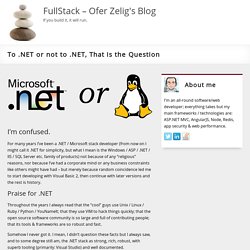
The Rise And Fall Of The Full Stack Developer. Editor’s note: Peter Yared is the founder and CTO of Sapho and was formerly the CTO/CIO of CBS Interactive.
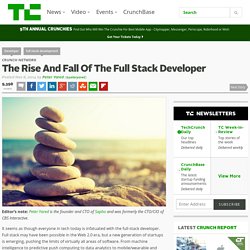
It seems as though everyone in tech today is infatuated with the full-stack developer. Full stack may have been possible in the Web 2.0 era, but a new generation of startups is emerging, pushing the limits of virtually all areas of software. From machine intelligence to predictive push computing to data analytics to mobile/wearable and more, it’s becoming virtually impossible for a single developer to program across the modern full stack.
When I first started programming computers as a kid in the pre-mobile, pre-web late 1970s/early 1980s, a single person typically wrote a complete software program from start to finish, and there weren’t many other layers of software between the programmer and the hardware. Using assembly language was the norm for programmers trying to squeeze more performance and space out of machines with 8-bit processors and very limited memory. Stop Breaking the Web. It makes me sad to point out that we as a community have failed the web.

Beating the Averages. April 2001, rev.
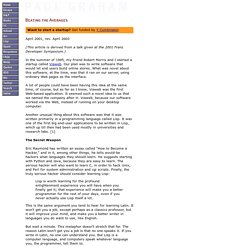
April 2003 (This article is derived from a talk given at the 2001 Franz Developer Symposium.) In the summer of 1995, my friend Robert Morris and I started a startup called Viaweb. Our plan was to write software that would let end users build online stores. The Vietnam of Computer Science. (Two years ago, at Microsoft's TechEd in San Diego, I was involved in a conversation at an after-conference event with Harry Pierson and Clemens Vasters, and as is typical when the three of us get together, architectural topics were at the forefront of our discussions.

An crowd gathered around us, and it turned into an impromptu birds-of-a-feather session. The subject of object/relational mapping technologies came up, and it was there and then that I first coined the phrase, "Object/relational mapping is the Vietnam of Computer Science". In the intervening time, I've received numerous requests to flesh out the discussion behind that statement, and given Microsoft's recent announcement regarding "entity support" in ADO.NET 3.0 and the acceptance of the Java Persistence API as a replacement for both EJB Entity Beans and JDO, it seemed time to do exactly that.) No armed conflict in US history haunts the American military more than $g(Vietnam).
History Johnson's War. Object Oriented Programming is an expensive disaster which must end. Is Enterprise Architecture Completely Broken? Fear Driven Development - FDD. We’ve reached the end of “build it yourself” software. On May 7, 1947, Levitt & Sons announced its first rental homes in Levittown, New York.
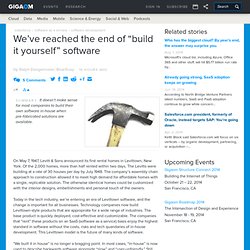
Of the 2,000 homes, more than half rented within two days. The Levitts were building at a rate of 30 houses per day by July 1948. The company’s assembly chain approach to construction allowed it to meet high demand for affordable homes with a single, replicable solution. The otherwise identical homes could be customized with the interior designs, embellishments and personal touch of the owners. You have ruined HTML. Talend Components Creation Tutorial - PowerUp BI consulting. Why I Hate Frameworks. I'm currently in the planning stages of building a hosted Java web application (yes, it has to be Java, for a variety of reasons that I don't feel like going into right now).
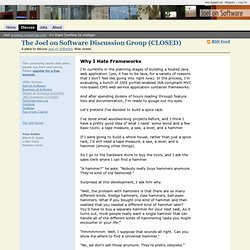
The Framework Myth. If ever there was an irresistible programmer’s platitude, it is that code-reuse is invariably a good thing.
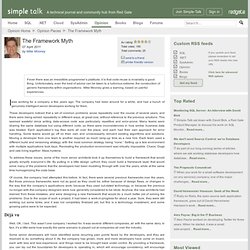
Unfortunately, even the best of advice can be taken to a ludicrous extreme, the construction of generic frameworks within organisations. Mike Mooney gives a warning, based on painful experiences. I was working for a company a few years ago: The company had been around for a while, and had a bunch of genuinely intelligent senior developers working for them. These developers noticed that a set of common problems arose repeatedly over the course of several years, and there were being solved repeatedly in different ways, at great cost, without reference to the previous solutions. This seemed wasteful since writing data-access code was particularly repetitive and error-prone. To address these issues, some of the more senior architects took it up themselves to build a framework that would greatly simplify everyone’s life. tFTPPut No match file exist! (Page 1) / Usage, Operation / Talend Community Forum.